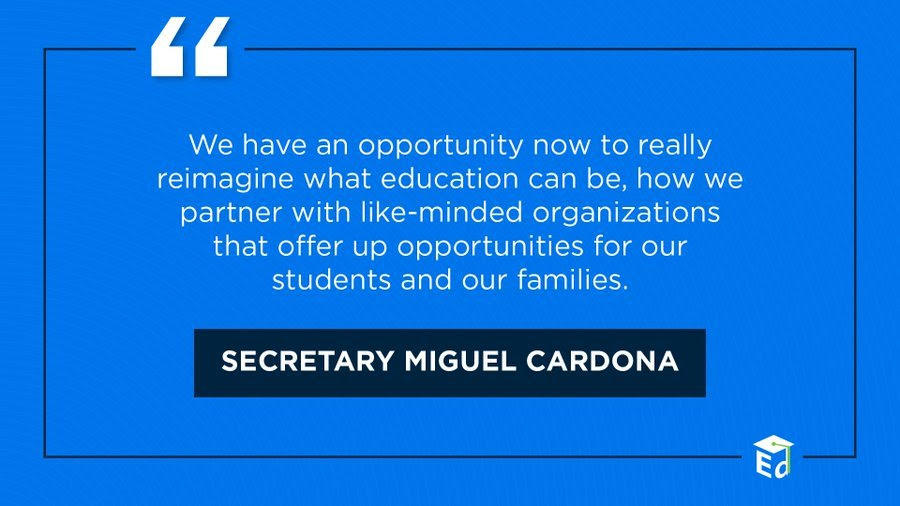
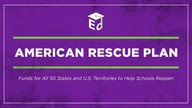
American Rescue Plan Elementary and Secondary School Emergency Relief
On March 17, the U.S. Department of Education (Department) announced the amount of American Rescue Plan (ARP) Elementary and Secondary School Emergency Relief (ESSER) funding that each state, Puerto Rico, and the District of Columbia will receive to support their efforts to reopen K–12 schools safely this month and equitably expand opportunity for students who need it most. The ARP ESSER funds may be used to address the many impacts of COVID-19 on pre-K through grade 12 education, including funding crucial summer, after-school, and other extended learning and enrichment programs. Secretary Cardona encouraged states to make sure students who have been hit hardest by COVID-19 are provided with the resources and support they need to emerge from this pandemic stronger.
|
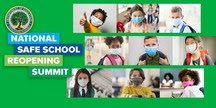
National Safe School Reopening Summit
Last month, the Department hosted the National Safe School Reopening Summit, gathering key education stakeholders from across the country to discuss best practices on reopening schools quickly and safely. The program featured remarks from President Biden, Vice President Harris, first Lady Dr. Jill Biden, Secretary Cardona, and Director of the Centers for Disease Control and Prevention Dr. Rochelle Walensky. It also featured panels of students, educators, and, school district leaders who discussed their strategies for reopening and the impact the pandemic has had on their in-person instruction.
The summit was one in a series of steps the Department is taking to provide support and resources to K–12 schools as they work to reopen and equitably address the academic, social, and emotional needs of students most impacted by the pandemic.
|
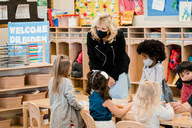
First Lady Sets Priorities for Relaunched Initiative to Help Military Families
Joining Forces is back! First lady of the United States, Dr. Jill Biden, recently announced the initiative’s restart on April 7, 2021. Joining Forces plans to continue working with military families by addressing their education, employment, entrepreneurship, health, and well-being concerns. The first lady and former first lady Michelle Obama started Joining Forces in 2011. Their partnership during the Obama administration led to a renewed look at how military families are engaged. The goal is for the work to expand and become a permanent priority of future White Houses. Please view the kickoff video with Dr. Jill Biden on Joining Forces | The White House.
|
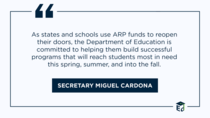
Addressing the Impact of COVID-19 Through Summer Learning and Enrichment
On March 29, the Department and the Center to Improve Social and Emotional Learning and School Safety at WestEd hosted the virtual discussion “Addressing the Impact of COVID-19 through Summer Learning and Enrichment.” The webinar elevated the evidence-based components of high-quality summer and enrichment programming, described how ARP funds can be used to support their design and implementation, and detailed how these opportunities may be available this summer and beyond by building capacity, including the role of philanthropy and community-based partners.
|

Urging High School Students to Complete the FAFSA
As students and families prepare for education post high school, finances and costs are serious considerations. The impact of the COVID-19 emergency makes decisions about higher education even harder. Completing the Free Application for Federal Student Aid (FAFSA®) form is the first step students and families can take to access federal dollars for college or career school. Federal Student Aid reports a decline in the number of high school seniors who have submitted the 2021–22 FAFSA form. States have limited funds, so it’s important for students and families to know their state’s deadline and submit the FAFSA form as early as possible.
|
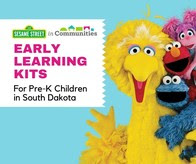
Statewide Collaboration Gets High-Quality Early Learning Materials to Recipients Across South Dakota
The South Dakota Statewide Family Engagement Center (SD SFEC) is partnering with South Dakota Public Broadcasting (SDPB), School Board Association of South Dakota, South Dakota Association for the Education of Young Children, and Early Learner South Dakota to send early learning kits to young children across the state. SDPB was one of 20 television stations across the country to receive a Sesame Street in Communities grant to provide early learning kits to teachers, families, and child-care providers. For these kits, the SD SFEC created 24 kindergarten readiness cards, which can be downloaded on its website.
|
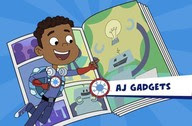
AJ Gadgets at Hero Elementary
Twin Cities Public Television, a 2015 and 2020 recipient of the ED-funded Ready to Learn Programming grant launched the Hero Elementary show in the summer of 2020, featuring students who are superheroes. One student, AJ Gadgets, has a passion for comic books, superheroes, and their gadgets, along with a sensitivity to noises and scents, and a high attention to details. AJ also happens to be on the autism spectrum. He processes the power of thought projection with instant replay to help the other superheroes remember the details they may have forgotten. To his superhero friends, AJ is a team member — who just happens to have Autism Spectrum Disorder.
|

Family-to-Family Q&A
Collaborative Action for Family Engagement (CAFE), a project of the Mid-Atlantic Equity Consortium has loaded with information and resources to help families adjust to life in the “new normal” of COVID-19. As an addition to the newsletter, families from the Maryland and Pennsylvania advisory councils will provide tips and strategies based on questions submitted by families across the two states. Access to the family-to-family conversations are on the CAFE webpage, where you can also complete a survey providing guidance to other parents.
|
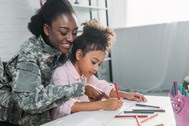
Celebrating MilKids
Military children and families (MilKids) have shown resilience and strength during the challenges resulting from the COVID-19 pandemic. During the month of April, @Military1Source has resources and virtual events for children and parents to provide support to military families and help MilKids thrive.
|
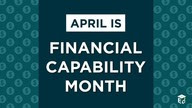
Financial Literacy Helps Families Thrive
The Families Forward Demonstration examines new strategies to improve the earnings and financial capabilities of noncustodial parents who owe child support. In partnership with the Office of Child Support Enforcement (OCSE), the W.K. Kellogg Foundation, and child support agencies in several states, public-private partnerships test ways to improve financial outcomes for noncustodial parents and increase their ability to support their children. During Financial Literacy Month (April), Linda Boyer, OCSE’s acting commissioner, shares tips and resources to help families thrive.
|
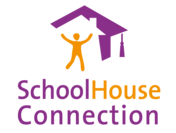
The ABCs of Racial Literacy
SchoolHouse Connection announced Coming Together: The ABCs of Racial Literacy in partnership with Sesame Street in Communities. Coming Together resources support children’s emerging knowledge of individual and group identity, curiosity, resilience, and empathy to prepare them to build the skill set to talk about race and identity and respond to racism.
|
|





